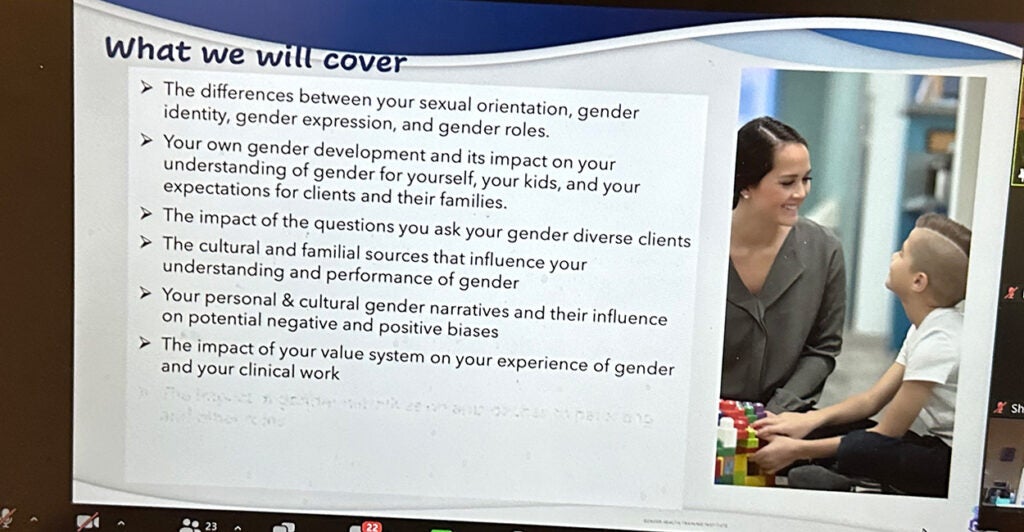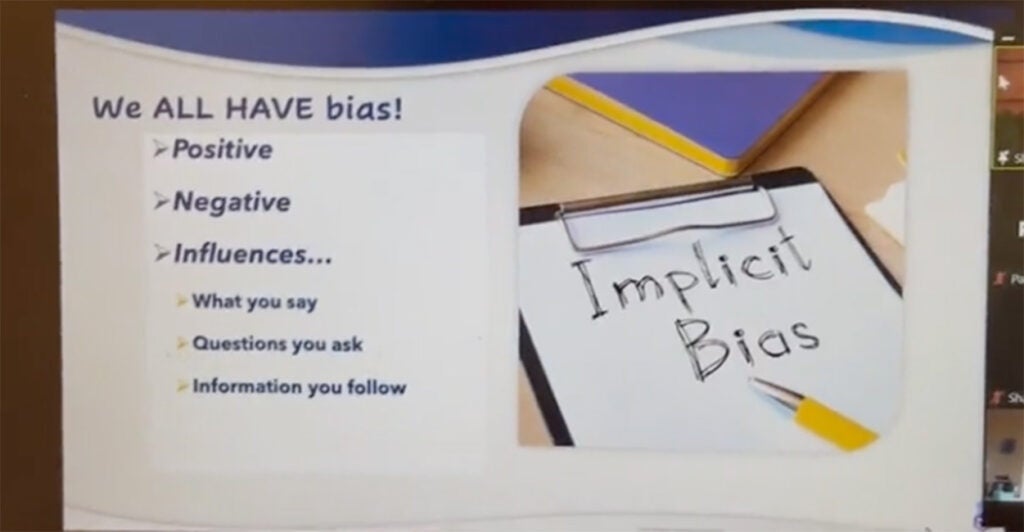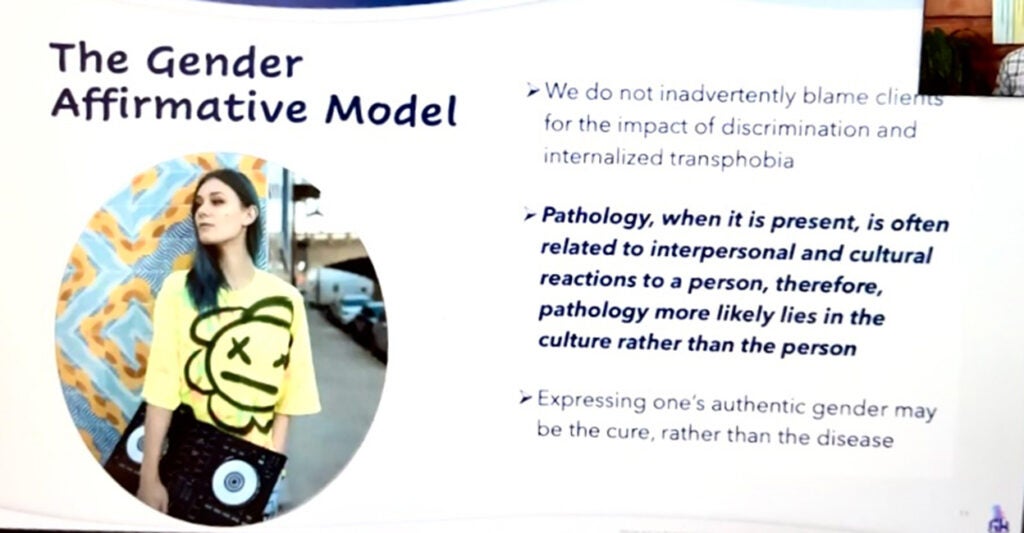We support our Publishers and Content Creators. You can view this story on their website by CLICKING HERE.
FIRST ON THE DAILY SIGNAL—A group of family therapists learned that denying so-called gender-affirming care to children is an example of “implicit bias” in a Zoom call recorded Monday and obtained by The Daily Signal.
The Zoom-based training, titled “Recognizing Bias: Avoiding Pitfalls in Gender-Affirming Care,” was hosted by family psychologist Dr. Shawn Giammattei, who identifies as a transgender man. Giammattei’s training teaches marriage and family therapists to overcome their “unconscious bias” toward transgender children.
Pamela Garfield-Jaeger, a self-described “anti-woke” social worker and author of “A Practical Response to Gender Distress: Tips and Tools for Families,” attended the Zoom training call Monday and shared the recording of it with The Daily Signal.
“A lot of ageism that comes up is about kids’ ability to know themselves and what age they can actually make informed decisions about their medical care,” Giammattei said during the training call, “and that we have this idea actually that trans people can’t know it no matter how old they are.”
The training call came shortly after medical nonprofit watchdog Do No Harm launched a database of 225 hospitals that provide sex-change surgeries, puberty blockers, and/or hormone therapies to children. Nearly 14,000 American children underwent sex-change interventions of some type between 2019 and 2023, according to Do No Harm.
Minors who received transgender medical procedures increasingly have been detransitioning after regretting that they took hormones and/or had healthy body parts surgically removed. Chloe Cole says she started identifying as a boy at 12 years old and went under the knife at just 15, only to regret it a few months later.
Giammattei uses the “gender-affirmative model” of counseling, which assumes that “the kid is the expert on their own identity.”
Giammattei is the founder and CEO of three gender counseling organizations: the Gender Health Training Institute, Quest Family Therapy, and TransFamily Alliance. Giammettei is a psychology professor and associate director of mental health at the Child and Adolescent Gender Center Department of Pediatrics at UCSF Benioff Children’s Hospital in San Francisco.
Giammattei did not respond to The Daily Signal’s request for comment.
Giammattei started the Zoom session with a “land acknowledgment” before stating the purpose of the training: making listeners aware of the “types of bias that arise in even the most gender-affirming providers.”
“So there’s a lot of internalized transphobia that we all end up with, or homophobia, or all the rest of those things,” the psychologist said.
The training aimed to help therapists consider “your own personal and cultural gender narratives and their influence on potential negative and positive biases” by covering “your own gender development and its impact on your understanding of gender for yourself, your kids, and your expectations for clients and their families.”

The most common form of implicit bias against transgender people, the transgender instructor said on the Zoom call, is “parents not supporting their kids.”
“The difference between kids who are supported is that about 4% of them are suicidal,” Giammattei said. “It’s about on par with the rest of the population. For those who are not supported by their parents, 54%.”
Giammattei’s statement is in line with what critics call a common lie told to parents: that they have to choose between a living son and a dead daughter.
The psychologist also argued that there is a “relationship between anti-trans laws and suicidality.”
After discussing suicide rates for trans youth, Giammattei said that “people who were able to get access to gender-affirming care were doing a lot better. They were much happier.”
Giammattei admitted that many family therapists are “child-centered,” ignoring the parents or guardians of minors.
“We tend to do collateral work with parents, and we don’t include them on the journey,” Giammattei said. “We expect them to just show up and get it. And they have a whole process that they need to go through that’s part of this. And so I think that it’s frustrating. It’s like, why do I have to work with you?”
Therapists are often “unaware of the beliefs we have that may impact our clients,” Giammattei said, adding: “I have these negative biases, and I can feel them in my body.”

Giammattei refers to herself as a “man” with “white privilege” who constantly needs to go through “the cisgender privilege checklist.”
“I stand here before you as a very privileged man,” Giammattei said. “I’ll put it that way. Even though I have a transgender experience, I’m privileged in the fact that my family was affluent, although I ended up homeless.”
Holding “the idea that sex outside of your marriage is infidelity” is an example of bias, the psychologist said, describing asking clients about their “take on consensual nonmonogamy” and “polyamory.”
Therapists are biased if they believe those things are wrong, Giammattei said.
“I may push more for people to try things that they may not have thought of,” the psychologist said.
Transgender individuals are victims of transphobia and the cure to their struggles is “expressing one’s authentic gender.”

“Gender variations are not disorders,” one slide read by the presenter says. “Gender presentations are diverse and varied across culture, requiring cultural sensitivity/humility.”
Giammattei advertised a two-day training session later this month titled “Unpacking and Contextualizing Gender: Managing Bias in the Therapeutic Relationship.”
Such awareness training is an “ongoing, never-ending process” about “becoming fully aware of what’s happening in our biases and how they impact the work that we do,” Giammattei said.

 Conservative
Conservative  Search
Search Trending
Trending Current News
Current News 





